Piper Profiles- Andy May & Allan Macdonald
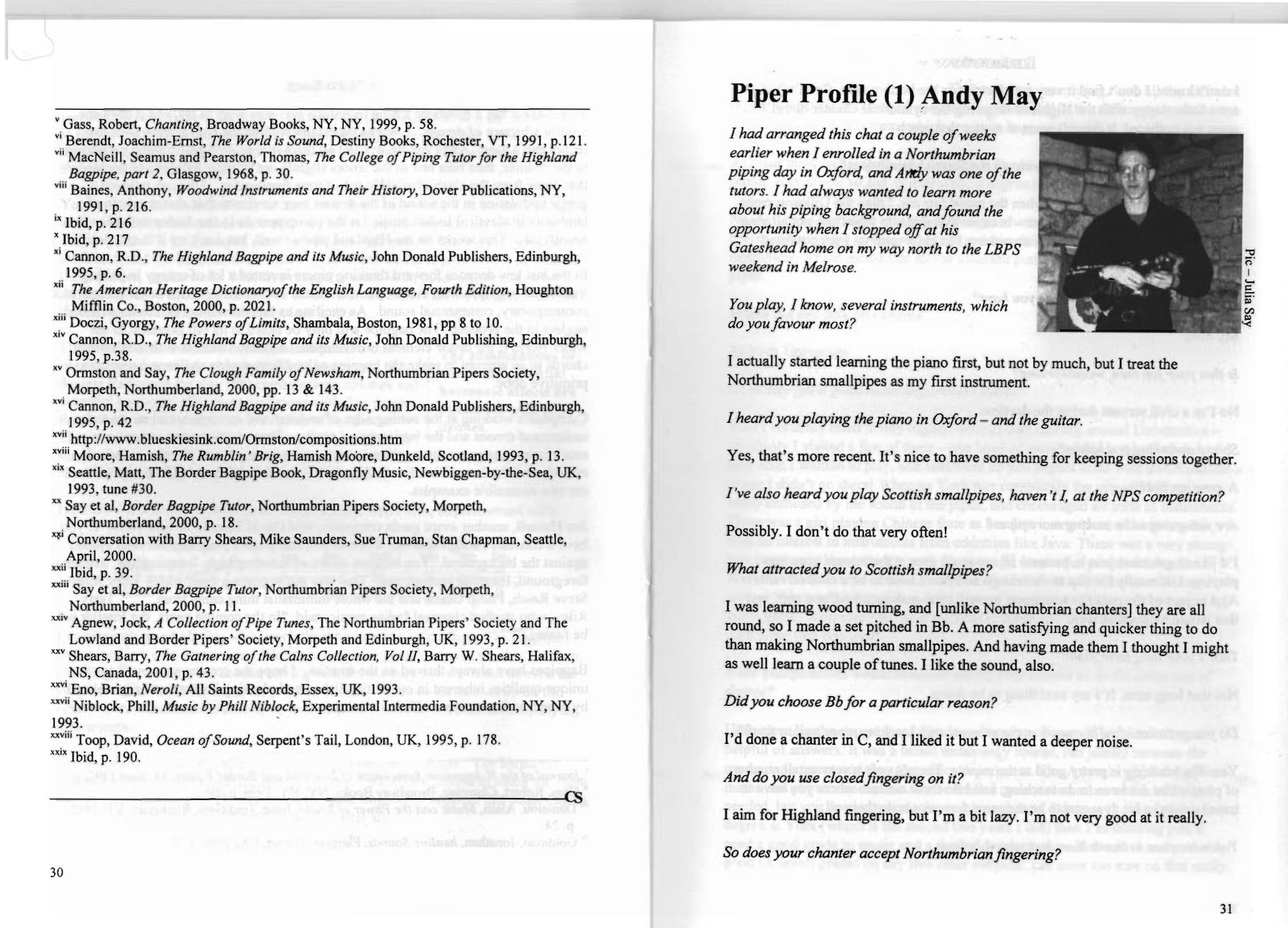
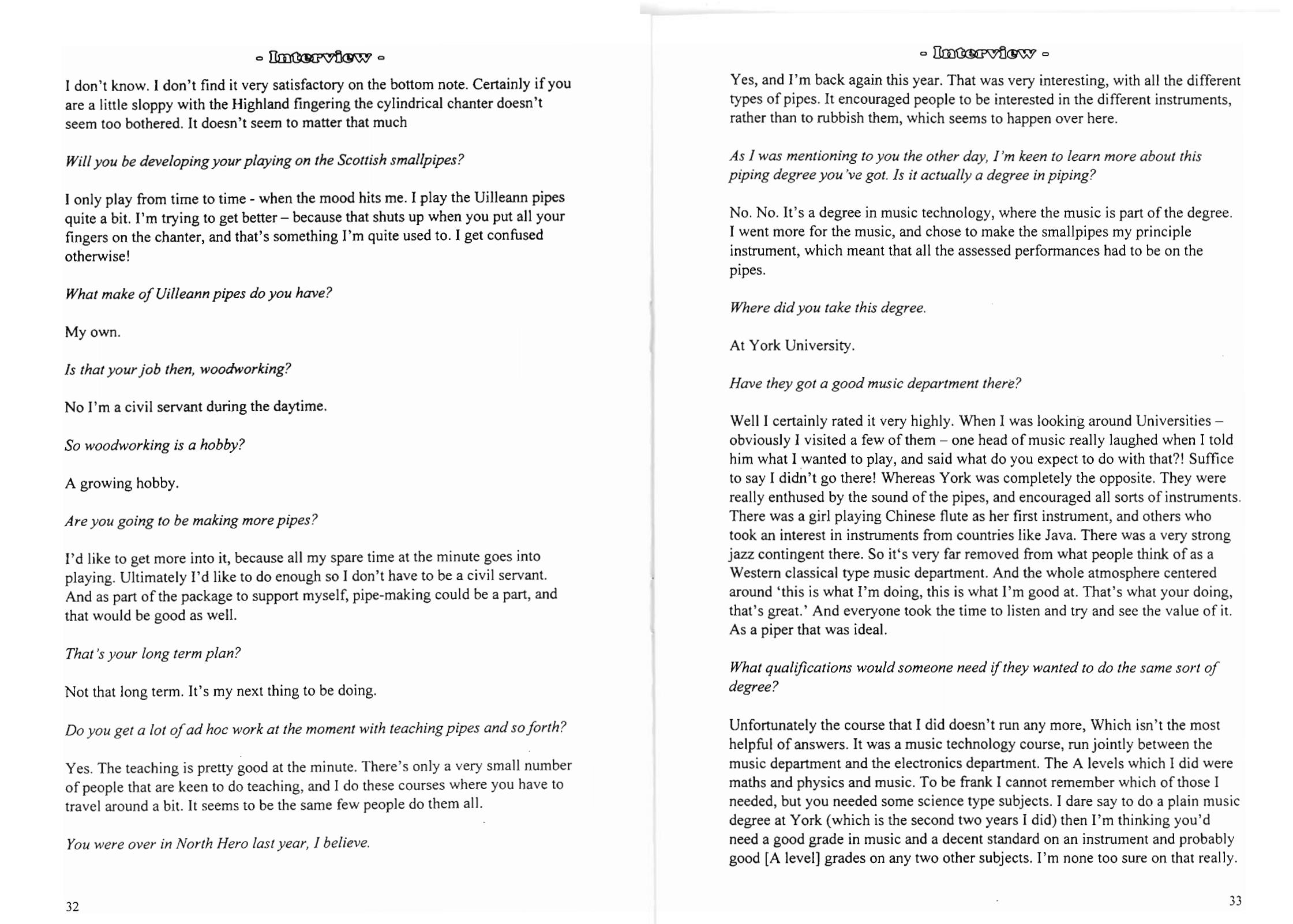
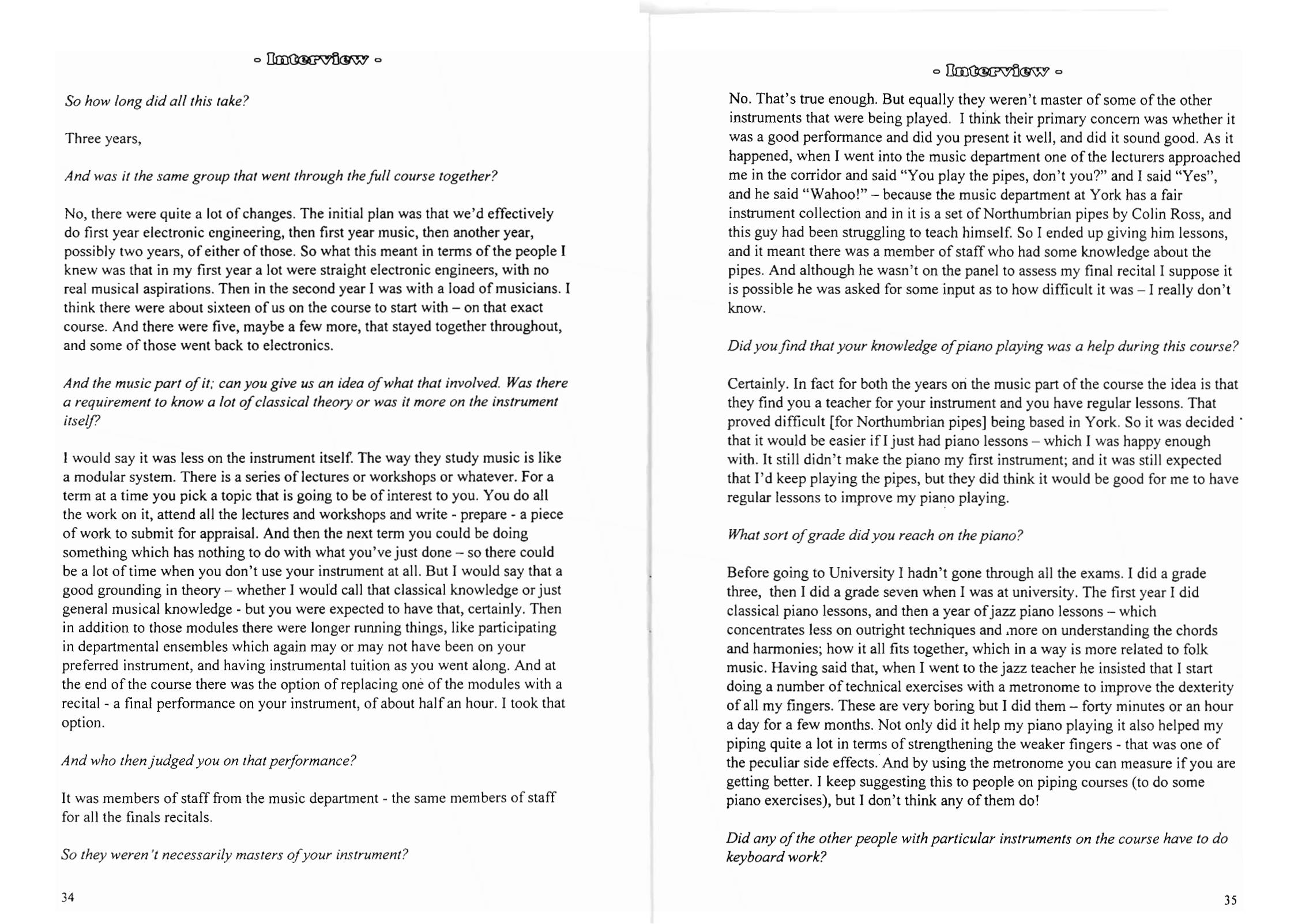
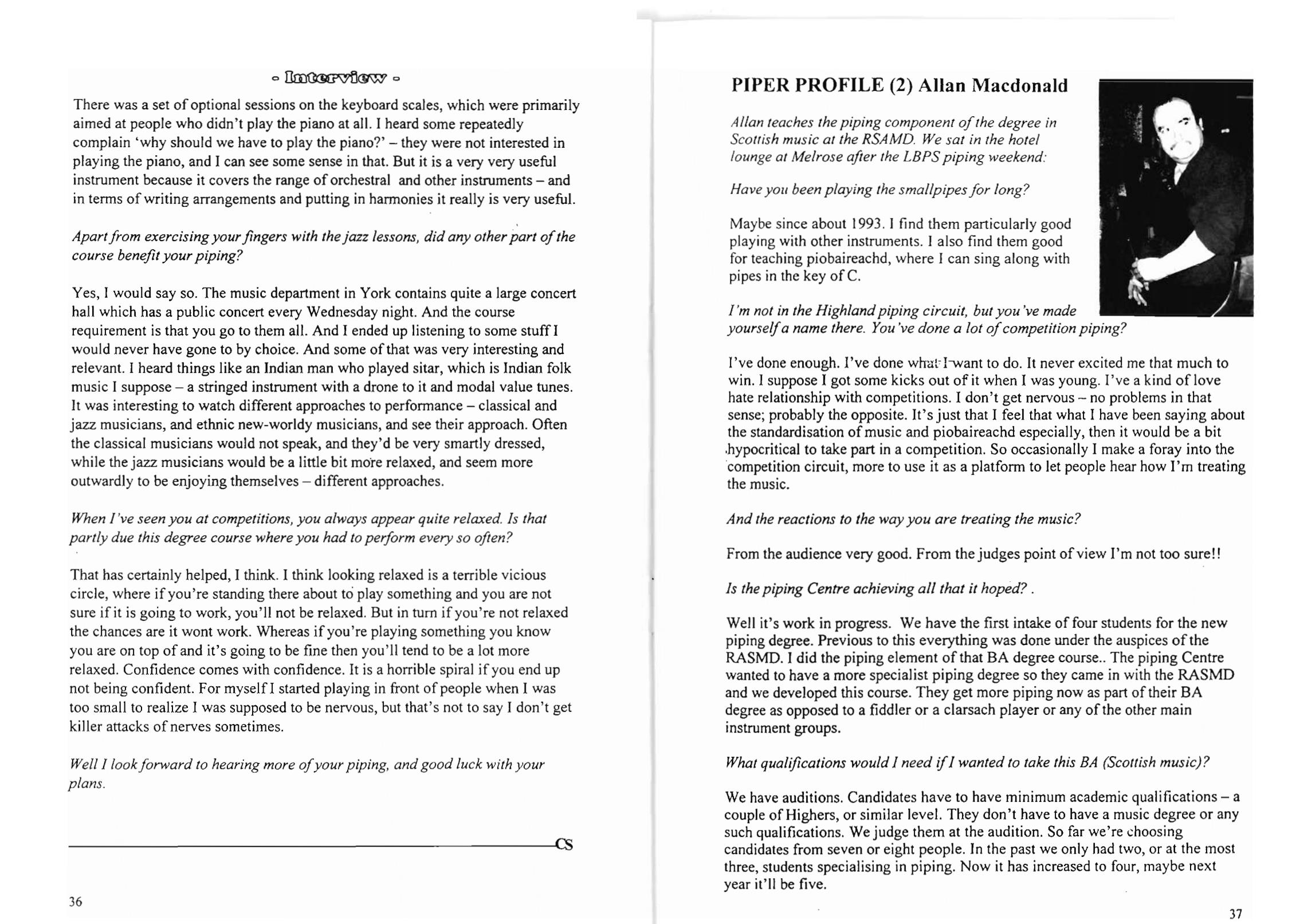
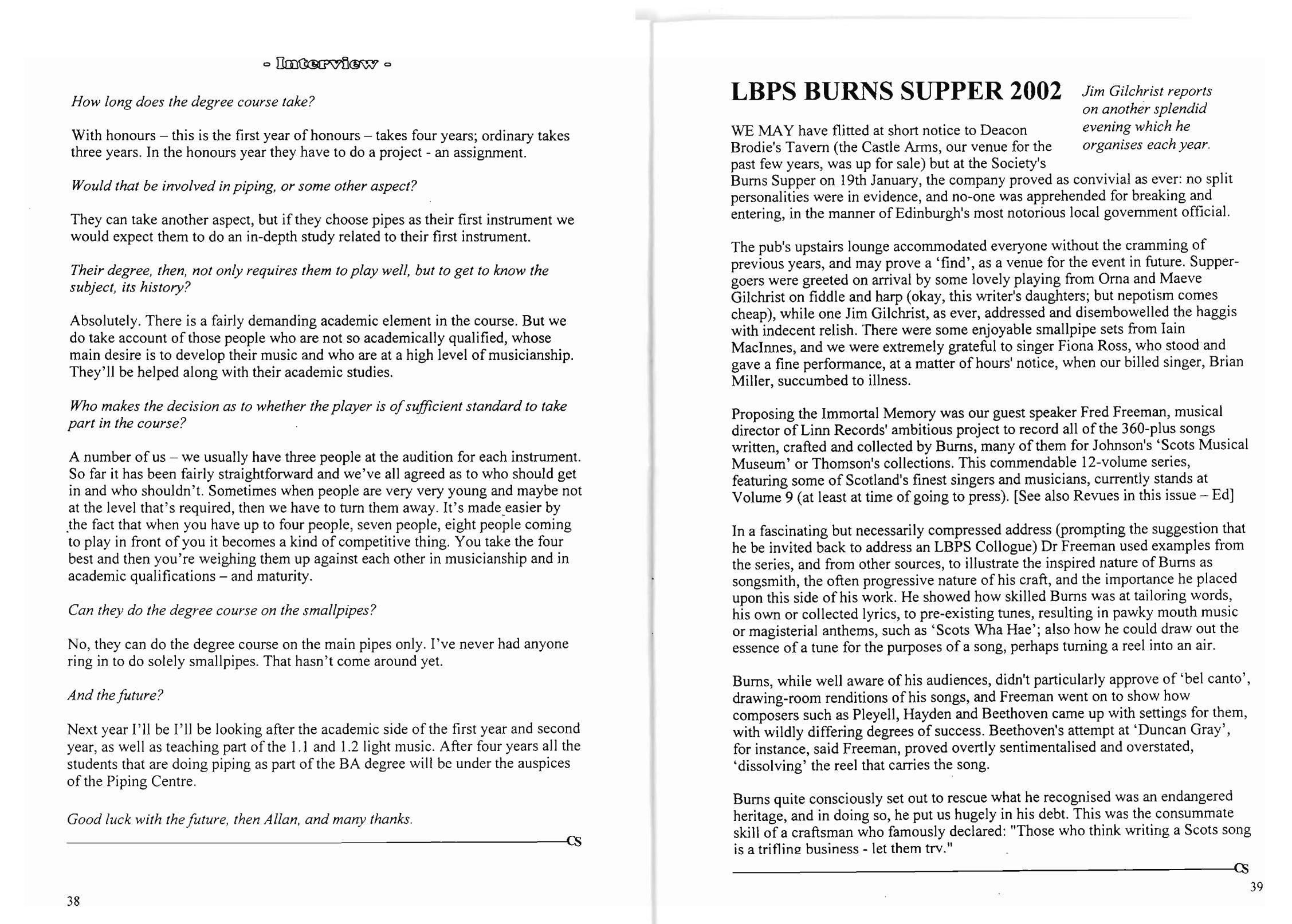
1 had arranged this chat a couple of weeks earlier when I enrolled in a Northumbrian piping day in Oxford, and Andy was one of the tutors.
I had always wanted to learn more about his piping background, and found the opportunity when I stopped off at his Gateshead home on my way north to the LBPS weekend in Melrose.
You play, I know, several instruments, which do you favour most?
I actually started learning the piano first, but not by much, but I treat the Northumbrian smallpipes as my first instrument.
I heard you playing the piano in Oxford - and the guitar.
Yes, that’s more recent. It’s nice to have something for keeping sessions together. I’ve also heard you play Scottish smallpipes, haven’t I, at the NFS competition? Possibly. I don’t do that very often!
What attracted you to Scottish smallpipes?
I was learning wood turning, and [unlike Northumbrian chanters] they are all round, so I made a set pitched in Bb. A more satisfying and quicker thing to do than making Northum- brian smallpipes. And having made them I thought I might as well learn a couple of tunes. I like the sound, also.
Did you choose Bb for a particular reason?
I’d done a chanter in C, and I liked it but I wanted a deeper noise.
And do you use closed fingering on it?
I aim for Highland fingering, but I’m a bit lazy. I’m not very good at it really.
So does your chanter accept Northumbrian fingering?
I don’t know. I don’t find it very satisfactory on the bottom note. Certainly if you are a little sloppy with the Highland fingering the cylindrical chanter doesn’t seem too bothered. It doesn’t seem to matter that much.
Will you be developing your playing on the Scottish smallpipes?
I only play from time to time - when the mood hits me. I play the Uilleann pipes quite a bit. I’m trying to get better - because that shuts up when you put all your fingers on the chanter, and that’s something I’m quite used to. I get confused otherwise!
What make of Uilleann pipes do you have?
My own.
Is that your job then, woodworking?
No, I’m a civil servant during the daytime.
So woodworking is a hobby?
A growing hobby.
Are you going to be making more pipes?
I’d like to get more into it, because all my spare time at the minute goes into playing. Ulti- mately I’d like to do enough so I don’t have to be a civil servant. And as part of the package to support myself, pipe-making could be a part, and that would be good as well.
That’s your long term plan?
Not that long term. It’s my next thing to be doing.
Do you get a lot of ad hoc work at the moment with teaching pipes and so forth?
Yes. The teaching is pretty good at the minute. There’s only a very small number of people that are keen to do teaching, and I do these courses where you have to travel around a bit. It seems to be the same few people do them all.
You were over in North Hero last year, I believe.
Yes, and I’m back again this year. That was very interesting, with all the different types of pipes. It encouraged people to be interested in the different instruments, rather than to rubbish them, which seems to happen over here.
As I was mentioning to you the other day, I’m keen to learn more about this piping degree you’ve got. Is it actually a degree in piping?
No. No. It’s a degree in music technology, where the music is part of the degree. I went more for the music, and chose to make the smallpipes my principle instrument, which meant that all the assessed performances had to be on the pipes.
Where did you take this degree.
At York University.
Have they got a good music department there?
Well I certainly rated it very highly. When I was looking around Universities - obviously I visited a few of them - one head of music really laughed when I told him what I wanted to play, and said what do you expect to do with that?! Suffice to say I didn’t go there! Whereas York was completely the opposite. They were really enthused by the sound of the pipes, and encouraged all sorts of instruments. There was a girl playing Chinese flute as her first instrument, and others who took an interest in instruments from countries like Java. There was a very strong jazz contingent there. So it‘s very far removed from what people think of as a Western classical type music department. And the whole atmosphere centered around ‘this is what I’m doing, this is what I’m good at. That’s what your doing, that’s great.’ And everyone took the time to listen and try and see the value of it. As a piper that was ideal.
What qualifications would someone need if they wanted to do the same sort of degree?
Unfortunately the course that I did doesn’t run any more, Which isn’t the most helpful of answers. It was a music technology course, run jointly between the music department and the electronics department. The A levels which I did were maths and physics and music. To be frank I cannot remember which of those I needed, but you needed some science type subjects. I dare say to do a plain music degree at York (which is the second two years I did) then I’m thinking you’d need a good grade in music and a decent standard on an instrument and probably good [A level] grades on any two other subjects. I’m none too sure on that really.
So how long did all this take?
Three years.
And was it the same group that went through the full course together?
No, there were quite a lot of changes. The initial plan was that we’d effectively do first year electronic engineering, then first year music, then another year, possibly two years, of either of those. So what this meant in terms of the people I knew was that in my first year a lot were straight electronic engineers, with no real musical aspirations. Then in the second year I was with a load of musicians. I think there were about sixteen of us on the course to start with - on that exact course. And there were five, maybe a few more, that stayed together throughout, and some of those went back to electronics.
And the music part of it; can you give us an idea of what that involved. Was there a requirement to know a lot of classical theory or was it more on the instrument itself?
I would say it was less on the instrument itself. The way they study music is like a modular system. There is a series of lectures or workshops or whatever. For a term at a time you pick
topic that is going to be of interest to you. You do all the work on it, attend all the lectures and workshops and write - prepare - a piece of work to submit for appraisal. And then the next term you could be doing something which has nothing to do with what you’ve just done - so there could be a lot of time when you don’t use your instrument at all. But I would say that a good grounding in theory - whether I would call that classical knowledge or just general musical knowledge - but you were expected to have that, certainly. Then in addition to those modules there were longer running things, like participating in departmental en- sembles which again may or may not have been on your preferred instrument, and having instrumental tuition as you went along. And at the end of the course there was the option of replacing one of the modules with a recital - a final performance on your instrument, of about half an hour. I took that option.
And who then judged you on that performance?
It was members of staff from the music department - the same members of staff for all the finals recitals.
So they weren 't necessarily masters of your instrument?
No. That’s true enough. But equally they weren’t master of some of the other instruments that were being played. I think their primary concern was whether it was a good perform- ance and did you present it well, and did it sound good. As it happened, when I went into the music department one of the lecturers approached me in the corridor and said “You play the pipes, don’t you?” and I said “Yes”, and he said “Wahoo!” - because the music depart- ment at York has a fair instrument collection and in it is a set of Northumbrian pipes by Colin Ross, and this guy had been struggling to teach himself. So I ended up giving him lessons, and it meant there was a member of staff who had some knowledge about the pipes. And although he wasn’t on the panel to assess my final recital I suppose it is possible he was asked for some input as to how difficult it was -I really don’t know.
Did you find that your knowledge of piano playing was a help during this course?
Certainly. In fact for both the years on the music part of the course the idea is that they find you a teacher for your instrument and you have regular lessons. That proved difficult [for Northumbrian pipes] being based in York. So it was decided that it would be easier if I just had piano lessons - which I was happy enough with. It still didn’t make the piano my first instrument; and it was still expected that I’d keep playing the pipes, but they did think it would be good for me to have regular lessons to improve my piano playing.
What sort of grade did you reach on the piano?
Before going to University I hadn’t gone through all the exams. I did a grade three, then I did a grade seven when I was at university. The first year I did classical piano lessons, and then a year of jazz piano lessons - which concentrates less on outright techniques and more on understanding the chords and harmonies; how it all fits together, which in a way is more
more related to folk music. Having said that, when I went to the jazz teacher he insisted that I start doing a number of technical exercises with a metronome to improve the dexterity of all my fingers. These are very boring but I did them - forty minutes or an hour a day for a few months. Not only did it help my piano playing it also helped my piping quite a lot in terms of strengthening the weaker fingers - that was one of the peculiar side effects. And by using the metronome you can measure if you are getting better. I keep suggesting this to people on piping courses (to do some piano exercises), but I don’t think any of them do!
Did any of the other people with particular instruments on the course have to do keyboard work?
There was a set of optional sessions on the keyboard scales, which were primarily aimed at people who didn’t play the piano at all. I heard some repeatedly complain ‘why should we have to play the piano?’ - they were not interested in playing the piano, and I can see some sense in that. But it is a very very useful instrument because it covers the range of orchestral and other instruments - and in terms of writing arrangements and putting in harmonies it really is very useful.
Apart from exercising your fingers with the jazz lessons, did any other part of the course benefit your piping?
Yes, I would say so. The music department in York contains quite a large concert hall which has a public concert every Wednesday night. And the course requirement is that you go to them all. And I ended up listening to some stuff I would never have gone to by choice. And some of that was very interesting and relevant. I heard things like an Indian man who played sitar, which is Indian folk music I suppose - a stringed instrument with a drone to it and modal value tunes. It was interesting to watch different approaches to performance - classical and jazz musicians, and ethnic new-worldy musicians, and see their approach.
Often the classical musicians would not speak, and they’d be very smartly dressed, while the jazz musicians would be a little bit more relaxed, and seem more outwardly to be enjoy- ing themselves - different approaches.
When I’ve seen you at competitions, you always appear quite relaxed. Is that partly due this degree course where you had to perform every so often?
That has certainly helped, I think. I think looking relaxed is a terrible vicious circle, where if you’re standing there about to play something and you are not sure if it is going to work, you’ll not be relaxed. But in turn if you’re not relaxed the chances are it won’t work.
Whereas if you’re playing something you know you are on top of and it’s going to be fine then you’ll tend to be a lot more relaxed. Confidence comes with confidence. It is a horrible spiral if you end up not being confident. For myself I started playing in front of people when I was too small to realize I was supposed to be nervous, but that’s not to say I don’t get killer attacks of nerves sometimes.
Well I look forward to hearing more of your piping, and good luck with your plans.
Allan teaches the piping component of the degree in Scottish music at the RSAMD. We sat in the hotel lounge at Melrose after the LBPS piping weekend:
Have you been playing the smallpipes for long?
Maybe since about 1993. I find them particularly good playing with other instruments. I also find them good for teaching piobaireachd, where I can sing along with pipes in the key of C.
I’m not in the Highland piping circuit, but you’ve made yourself a name there. You’ve done a lot of competition piping?
I’ve done enough. I’ve done what I want to do. It never excited me that much to win. I sup- pose I got some kicks out of it when I was young. I’ve a kind of love hate relationship with competitions. I don’t get nervous - no problems in that sense; probably the opposite. It’s just that I feel that what I have been saying about the standardisation of music and piobaireachd especially, then it would be a bit hypocritical to take part in a competition. So occasionally I make a foray into the competition circuit, more to use it as a platform to let people hear how I’m treating the music.
And the reactions to the way you are treating the music?
From the audience very good. From the judges point of view I’m not too sure!!
Is the Piping Centre achieving all that it hoped? .
Well, it’s work in progress. We have the first intake of four students for the new piping degree. Previous to this everything was done under the auspices of the RASMD. I did the piping element of that BA degree course.. The piping Centre wanted to have a more special- ist piping degree so they came in with the RASMD and we developed this course. They get more piping now as part of their BA degree as opposed to a fiddler or a clarsach player or any of the other main instrument groups.
What qualifications would I need if I wanted to take this BA (Scottish music)?
We have auditions. Candidates have to have minimum academic qualifications - a couple of Highers, or similar level. They don’t have to have a music degree or any such qualifications. We judge them at the audition. So far we’re choosing candidates from seven or eight peo- ple. In the past we only had two, or at the most three, students specialising in piping. Now it has increased to four, maybe next year it’ll be five.
How long does the degree course take?
With honours - this is the first year of honours - takes four years; ordinary takes three years. In the honours year they have to do a project - an assignment.
Would that be involved in piping, or some other aspect?
They can take another aspect, but if they choose pipes as their first instrument we would expect them to do an in-depth study related to their first instrument.
Their degree, then, not only requires them to play well, but to get to know the subject, its history?
Absolutely. There is a fairly demanding academic element in the course. But we do take account of those people who are not so academically qualified, whose main desire is to develop their music and who are at a high level of musicianship. They’ll be helped along with their academic studies.
Who makes the decision as to whether the player is of sufficient standard to take part in the course?
A number of us - we usually have three people at the audition for each instrument. So far it has been fairly straightforward and we’ve all agreed as to who should get in and who shouldn’t. Sometimes when people are very very young and maybe not at the level that’s required, then we have to turn them away. It’s made easier by the fact that when you have up to four people, seven people, eight people coming to play in front of you it becomes a kind of competitive thing. You take the four best and then you’re weighing them up against each other in musicianship and in academic qualifications - and maturity.
Can they do the degree course on the smallpipes?
No, they can do the degree course on the main pipes only. I’ve never had anyone ring in to do solely smallpipes. That hasn’t come around yet.
And the future?
Next year I’ll be I’ll be looking after the academic side of the first year and second year, as well as teaching part of the 1.1 and 1.2 light music. After four years all the students that are doing piping as part of the BA degree will be under the auspices of the Piping Centre.
Good luck with the future, then Allan, and many thanks.
